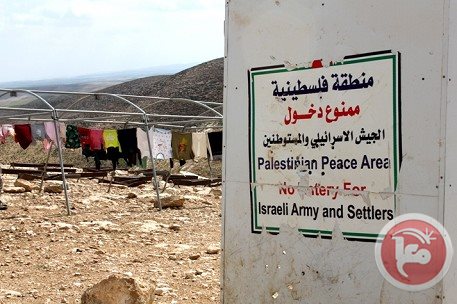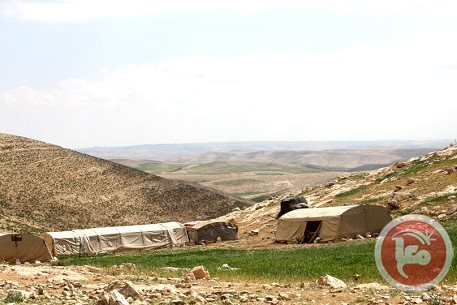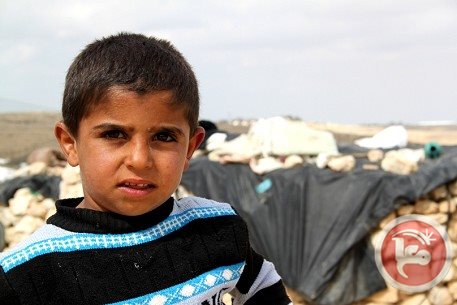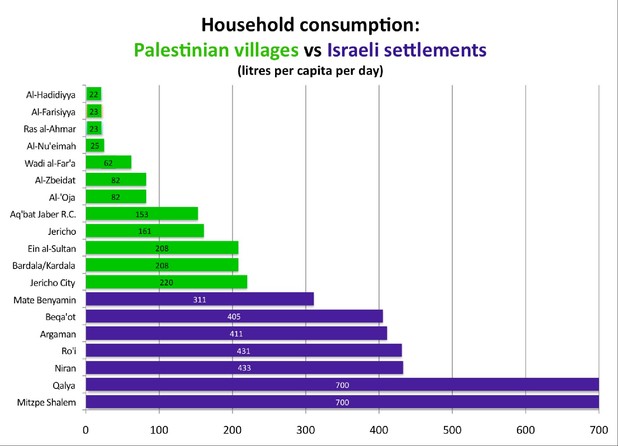17 apr 2013
Dozens of Settlers Storm south of Jenin, Solomon's Pools

Dozens of Israeli settlers stormed on Tuesday the evacuated Homesh settlement south of Jenin and performed Talmudic rituals. Local sources confirmed that a bus carrying dozens of settlers, under the protection of Israeli soldiers, stormed the area and performed their religious rituals.
The Israeli occupation forces stationed at Jenin-Nablus main road, while the settlers stoned the vehicles passing by the Burqa and Seilat al-Dhaher villages.
In the same context, dozens of settlers stormed Solomon's Pools south of Bethlehem and performed their religious rituals.
It's worth mentioning that these continued attempts to storm Solomon's Pools prove the settlers' intention to seize the area in order to annex it to Gush Etzion settlement bloc.
Meanwhile, the Israeli attempts to take control over a water source near the city of al-Khalil in the southern West Bank still continued recently.
The Palestinian residents expressed their fears towards the settlers' repeated breakings into the area in an attempt to seize the water sources especially that they have raised the Israeli flag near it.
Furthermore, a number of Israeli settlers uprooted about 20 olive seedlings in Palestinian land in the town of Seir south of al-Khalil city.
Eyewitnesses told Land Research Center in al-Khalil that 20 olive seedlings, provided by the Ministry of Agriculture within Palestine greening project were uprooted and stolen by Israeli settlers.
The Israeli occupation forces stationed at Jenin-Nablus main road, while the settlers stoned the vehicles passing by the Burqa and Seilat al-Dhaher villages.
In the same context, dozens of settlers stormed Solomon's Pools south of Bethlehem and performed their religious rituals.
It's worth mentioning that these continued attempts to storm Solomon's Pools prove the settlers' intention to seize the area in order to annex it to Gush Etzion settlement bloc.
Meanwhile, the Israeli attempts to take control over a water source near the city of al-Khalil in the southern West Bank still continued recently.
The Palestinian residents expressed their fears towards the settlers' repeated breakings into the area in an attempt to seize the water sources especially that they have raised the Israeli flag near it.
Furthermore, a number of Israeli settlers uprooted about 20 olive seedlings in Palestinian land in the town of Seir south of al-Khalil city.
Eyewitnesses told Land Research Center in al-Khalil that 20 olive seedlings, provided by the Ministry of Agriculture within Palestine greening project were uprooted and stolen by Israeli settlers.
14 apr 2013
Water restrictions in Area C threaten to displace villages

A general view of Tuba, home to 145 people, in the south Hebron hills
By Charlie Hoyle
"Life is hard, but I won't leave the village," Zahira al-Jundi says.
Despite winter rainfall which has painted green patches on the rolling south Hebron hills, the 145 residents of Tuba face a daily struggle to access the most basic levels of water needed to survive.
Like 70 percent of Palestinian communities in Area C, Tuba is not connected to the water network.
The weekly sight of a water tanker negotiating the rocky sand-colored terrain to reach the village is a welcome relief for residents, but only a temporary measure to ease the humanitarian impact of an acute water shortage.
Located in 30,000 dunams of land designated by Israel as a closed military area, or Firing Zone 918, Israel's Civil Administration forbids all construction in Tuba. Villagers live in caves and tents and depend entirely on cisterns and tankered water to meet their daily needs.
"These communities live in conditions similar to that of a post-disaster situation, such as an earthquake or tsunami," Advocacy Task Force Officer for EWASH, Alex Abu Ata, tells Ma'an.
"People affected by natural disasters are forced to live in tents and have little access to water or food. They basically only have what is provided to them through aid."
International NGOs implement humanitarian projects in the south Hebron hills but cannot obtain authorization from Israel to build long-term water infrastructure.
"They can only really delay the problem, without ever solving it," Abu Ata says.
By Charlie Hoyle
"Life is hard, but I won't leave the village," Zahira al-Jundi says.
Despite winter rainfall which has painted green patches on the rolling south Hebron hills, the 145 residents of Tuba face a daily struggle to access the most basic levels of water needed to survive.
Like 70 percent of Palestinian communities in Area C, Tuba is not connected to the water network.
The weekly sight of a water tanker negotiating the rocky sand-colored terrain to reach the village is a welcome relief for residents, but only a temporary measure to ease the humanitarian impact of an acute water shortage.
Located in 30,000 dunams of land designated by Israel as a closed military area, or Firing Zone 918, Israel's Civil Administration forbids all construction in Tuba. Villagers live in caves and tents and depend entirely on cisterns and tankered water to meet their daily needs.
"These communities live in conditions similar to that of a post-disaster situation, such as an earthquake or tsunami," Advocacy Task Force Officer for EWASH, Alex Abu Ata, tells Ma'an.
"People affected by natural disasters are forced to live in tents and have little access to water or food. They basically only have what is provided to them through aid."
International NGOs implement humanitarian projects in the south Hebron hills but cannot obtain authorization from Israel to build long-term water infrastructure.
"They can only really delay the problem, without ever solving it," Abu Ata says.
In 2012, dozens of international aid agencies issued a collective call for Israel to halt the "continuous targeted destruction" of cisterns in Area C, labeling the demolitions a "clear breach" of international humanitarian law.
"If communities in Area C were allowed to develop real infrastructure they would have water by now, like all nearby Israeli settlements," Abu Ata says.
The Israeli water company Mekorot has built pipelines in the south Hebron hills to service settlements, outposts and agricultural industries but Palestinian villages, with the exception of al-Tuwani, have not been allowed to connect to the network.
"Israel's policy in the West Bank is to exercise pressure on communities in Area C to force them to leave. Demolishing water infrastructure is one of the means, as is harassment, and Israel pressures vulnerable communities, the poorest communities, in an effort to displace them," Abu Ata says.
The discrepancy in water consumption between Palestinians and Israeli settlers in the West Bank is vast. EWASH estimates that around 9,400 Israeli settlers in the Jordan Valley enjoy water allocation equal to almost a third of the consumption of the entire population of 2.5 million Palestinians.
Israelis, including settlers, have access to 300 liters of water per day, according to EWASH, while the West Bank average is around 70 liters, below the World Health Organization's recommended minimum of 100 liters per day for basic sanitation, hygiene and drinking.
In the south Hebron hills, average water consumption varies between 10-60 liters per day, similar to consumption levels in sub-Saharan Africa or Haiti.
"If communities in Area C were allowed to develop real infrastructure they would have water by now, like all nearby Israeli settlements," Abu Ata says.
The Israeli water company Mekorot has built pipelines in the south Hebron hills to service settlements, outposts and agricultural industries but Palestinian villages, with the exception of al-Tuwani, have not been allowed to connect to the network.
"Israel's policy in the West Bank is to exercise pressure on communities in Area C to force them to leave. Demolishing water infrastructure is one of the means, as is harassment, and Israel pressures vulnerable communities, the poorest communities, in an effort to displace them," Abu Ata says.
The discrepancy in water consumption between Palestinians and Israeli settlers in the West Bank is vast. EWASH estimates that around 9,400 Israeli settlers in the Jordan Valley enjoy water allocation equal to almost a third of the consumption of the entire population of 2.5 million Palestinians.
Israelis, including settlers, have access to 300 liters of water per day, according to EWASH, while the West Bank average is around 70 liters, below the World Health Organization's recommended minimum of 100 liters per day for basic sanitation, hygiene and drinking.
In the south Hebron hills, average water consumption varies between 10-60 liters per day, similar to consumption levels in sub-Saharan Africa or Haiti.
Several of the 14 water cisterns built by international NGOs have received demolition orders, and the village school received a stop-work order in January 2012.
Solar panels which provide electricity to run the pumps of the water cisterns have demolition orders pending and a sanitation unit for boys received a stop-work order in 2012, placing pressure on the 500-member community.
"Our work is very limited, and we do it in low visibility because otherwise we won't get permission from Israel," Palestinian water engineer Fadi Shamisti tells Ma'an.
The nearest filling point for water in Imneizil is over 12 kilometers away, Shamisti says, meaning that if the village's water cisterns were demolished, residents would face a huge physical and financial burden to access enough water for their community and livestock.
"Water is an essential commodity for people, and water therefore becomes a pressure tool to evacuate the area of people, as high prices create economic difficulties," Shamisti says.
Solar panels which provide electricity to run the pumps of the water cisterns have demolition orders pending and a sanitation unit for boys received a stop-work order in 2012, placing pressure on the 500-member community.
"Our work is very limited, and we do it in low visibility because otherwise we won't get permission from Israel," Palestinian water engineer Fadi Shamisti tells Ma'an.
The nearest filling point for water in Imneizil is over 12 kilometers away, Shamisti says, meaning that if the village's water cisterns were demolished, residents would face a huge physical and financial burden to access enough water for their community and livestock.
"Water is an essential commodity for people, and water therefore becomes a pressure tool to evacuate the area of people, as high prices create economic difficulties," Shamisti says.
|
A young boy pictured in front of a man-made cave in Tuba
With tankered water costing from between $8 to $12 per cubic meter, and rainwater collected over winter rarely lasting more than a few months, the community would have little choice but to relocate if demolition orders on water infrastructure were carried out. |
"The solution is simple," Shamisti says. "An Israeli settlement lies only one kilometer from both the communities of Tuba and Imneizil, yet they are unable to connect to the water network."
Fadwa Baroud, an information officer with the European Commission, told Ma'an that Area C communities were at risk of "forced displacement" due to the difficulty of obtaining permits from Israel for the development of water facilities.
But with international aid projects facing demolition and Israel's water policy in Area C clearly designed to exclude Palestinian communities, villagers are well aware of their vulnerability.
"Whatever they try to do, we will stay here. This is our land," Tuba resident Ibrahim al-Jundi says. "This is the place we were raised, we have no other place to go."
Fadwa Baroud, an information officer with the European Commission, told Ma'an that Area C communities were at risk of "forced displacement" due to the difficulty of obtaining permits from Israel for the development of water facilities.
But with international aid projects facing demolition and Israel's water policy in Area C clearly designed to exclude Palestinian communities, villagers are well aware of their vulnerability.
"Whatever they try to do, we will stay here. This is our land," Tuba resident Ibrahim al-Jundi says. "This is the place we were raised, we have no other place to go."
9 apr 2013
Israeli Soldiers Demolish Well, Farm House near Hebron

Israeli army Tuesday demolished a well and a farm house east of Yatta, south of Hebron, said local sources.
Ratib al-Jabour, coordinator of the Popular Committee against the Wall and Settlements in Yatta, said the soldiers raided the village and demolished the well and the farm house then handed a demolishing notice to another Palestinian.
Al-Jabour condemned these actions describing it as “arbitrary” which aim to displace the people of these areas for settlements expansion.
Ratib al-Jabour, coordinator of the Popular Committee against the Wall and Settlements in Yatta, said the soldiers raided the village and demolished the well and the farm house then handed a demolishing notice to another Palestinian.
Al-Jabour condemned these actions describing it as “arbitrary” which aim to displace the people of these areas for settlements expansion.
8 apr 2013
|
|
Israeli settlers use six times more water than Palestinians — new report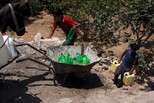
While Israeli settlers in the West Bank enjoy abundant access to water, these young Palestinians have to carry bottles of water on a donkey.
Israeli settlers in the West Bank consume six times as much water as Palestinians living nearby, the human rights organization Al Haq has found. In a new report released today, the organization exposes how Israel operates a system of water apartheid. Palestinian communities are strangled by Israel’s water policies through unlawful exploitation and appropriation of water resources, confiscation and destruction of water infrastructure and restriction of water supply, it says. Al Haq concludes that Israel’s water apartheid policies are based on three pillars. The first pillar concerns the distinction between two racial groups. The second pillar consists of the policies and practices that facilitate the segregation of the population into different geographical areas. |
|
Household consumption Palestinian villages vs Israeli settlements.
|
The third pillar rests upon the use of "security" laws to "justify" inhuman acts against Palestinians. It is important underscore that Israel’s water policies are part of an institutionalized system of domination and oppression.
Two distinct groups The first pillar of water apartheid requires the distinction of two groups, which is a core element of the crime of apartheid. The first group are the Palestinians who over the years have been unwillingly sub-divided into Palestinians citizens of Israel, Palestinians living in the West Bank and Gaza, and Palestinian refugees living in exile. All are Palestinian, because of their identity as the indigenous people of historic Palestine. In addition, their right to self-determination is internationally recognized. |
The second group is composed of Jewish-Israelis, meaning "Israelis with Jewish identity," an official category imposed and monitored by the State of Israel. It recognizes a person as a member of the global Jewish community, thereby granting certain rights, such as residency.
The Basic Laws — the closest thing that Israel has to a written constitution — distinguishes the group as "Jewish nationals." While Palestinians living in Israel can be citizens, nationality of Israel is reserved for Jews.
Segregation Israel has used the distinction between the Palestinian and Jewish-Israeli groups to segregate the population into different geographical areas — the second pillar of water apartheid. Inside Israel, the distinction is used to grant citizenship to only those Palestinians who remained inside Israel after 1948. At the same time, Israeli citizenship is granted beyond its territory to all Jews, regardless of their geographical location, personal history or affiliation to the territory.
In the West Bank, the segregation policies have resulted in two parallel and unequal societies. A privileged Jewish-Israeli settler society lives in illegal colonies with good conditions, including an uninterrupted, abundant supply of water. By contrast, the indigenous Palestinian society is denied most of its basic rights, including sovereignty over its own water resources.
Palestinians are forcibly confined to land-locked enclaves with minimum water resources available. As a result, Palestinian communities are strangled and cannot fully develop as a group: denying such development is considered an inhuman act under the UN’s 1973 Apartheid Convention. The commission of inhuman acts against the subordinate group is the second core element of the definition of apartheid.
Strangulation In its report, Al Haq provides extensive information about how Israel’s discriminatory water policies lead to the strangulation of Palestinian communities. For example, water apartheid policies result in huge differences in water consumption. For example, the consumption of over 500,000 Israeli settlers in the West Bank is about six times higher than that of 2.6 million Palestinians in the West Bank (excluding East Jerusalem.)
Moreover, the Palestinian average water consumption of 73 liter per capita per day does not reach the minimum consumption level of 100 liters recommended by the World Health Organization (WHO). Israelis living inside Israel use about 300 liters and Israeli settlers in the West Bank use 369 liters each per day.
By September 2011, around 313,000 Palestinians were not connected to a water network. And about 50,000 Palestinians from 151 communities had to live on less than 20 liters each per day, an amount WHO recommends for "short-term survival" in emergency and disaster situations.
In occupied East Jerusalem, more than 50 percent of the Palestinians living there — around 160,000 people — do not have legal water connections because Israeli law does not allow it, mainly because the required housing permits are not issued. Furthermore, some Palestinian areas on the eastern side of the Israel’s wall in East Jerusalem have been excluded from the boundaries of the city. This has left the residents of Beit Iksa, Kufr Aqab, and Shuafat refugee camp with no access to municipal services, including water and sanitation.
In the Jordan Valley, water apartheid policies have resulted in extreme differences in water consumption between settlers and Palestinians, ranging from 700 liters per day in the settlements of Mitzpe Shalem and Qalya to a meager 22 liters for Palestinians in the village of al-Hadidiya.
(Al Haq) The 1.6 million inhabitants of the Gaza Strip depend for their natural water supply solely on the Coastal Aquifer next to the Strip. But as a transboundary water resource, Gaza has to share it with Israel, which has access to other water resources. However, the Gaza Strip can use only one quarter of total extractions from the Coastal Aquifer.
A responsible use of shared transboundary water resources requires coordination, something which Israel refuses. As a result, the water quality in the Gaza Strip has progressively deteriorated due to over-extraction and pollution of the Coastal Aquifer. The deterioration is also partly due to Israel’s policy of denying construction materials for wastewater treatment plants and other water-related infrastructure into the Gaza Strip. Therefore, about 90 to 95 per cent of the water it supplies is unfit for human consumption. It is estimated that the quality of water in the Coastal Aquifer will continue to deteriorate and may become unusable by 2016, when, in the absence of any alternatives, the Gaza Strip could become unfit for human habitation.
Institutionalized oppression The third pillar of Israel’s water apartheid rests upon its "security" laws, policies and practices. The water policies and practices are integrated in an institutionalized system of Jewish-Israeli domination and oppression of the Palestinians as a group — thus amounting to a system of "water apartheid."
For example, by occupying the West Bank (including East Jerusalem) and the Gaza Strip in the 1967 war, Israel increased its direct control over water resources in the region with nearly 50 percent. Immediately after the war, the water system for the West Bank and Gaza was integrated into the Israeli system through a series of military orders which are still in force today. Israel declared the banks of the lower Jordan River a closed military zone, denying access to Palestinians.
Furthermore, the construction of Israel’s wall in the West Bank has given Israel control over 28 agricultural wells.
Demolitions Israel has caused extensive damage to Palestinian water infrastructure during military attacks on the Gaza strip. For example, during Operation Cast Lead in late 2008 and early 2009, about 919 water wells, 229 irrigation pools and 243 water pumps were destroyed. Since 2005, more than 300 water wells have been destroyed in the so-called buffer zone.
In 2011, Israel demolished over 20 water wells, around 35 cisterns, and around 10 water tanks and springs in the West Bank (excluding East Jerusalem). At the same time, Israel confiscated 45 water, sanitation and hygiene structures in the same area. The water infrastructure was indispensable Palestinian rural and herder communities. In 2012, Israeli forces demolished at least 32 water structures took place between January and October.
The Basic Laws — the closest thing that Israel has to a written constitution — distinguishes the group as "Jewish nationals." While Palestinians living in Israel can be citizens, nationality of Israel is reserved for Jews.
Segregation Israel has used the distinction between the Palestinian and Jewish-Israeli groups to segregate the population into different geographical areas — the second pillar of water apartheid. Inside Israel, the distinction is used to grant citizenship to only those Palestinians who remained inside Israel after 1948. At the same time, Israeli citizenship is granted beyond its territory to all Jews, regardless of their geographical location, personal history or affiliation to the territory.
In the West Bank, the segregation policies have resulted in two parallel and unequal societies. A privileged Jewish-Israeli settler society lives in illegal colonies with good conditions, including an uninterrupted, abundant supply of water. By contrast, the indigenous Palestinian society is denied most of its basic rights, including sovereignty over its own water resources.
Palestinians are forcibly confined to land-locked enclaves with minimum water resources available. As a result, Palestinian communities are strangled and cannot fully develop as a group: denying such development is considered an inhuman act under the UN’s 1973 Apartheid Convention. The commission of inhuman acts against the subordinate group is the second core element of the definition of apartheid.
Strangulation In its report, Al Haq provides extensive information about how Israel’s discriminatory water policies lead to the strangulation of Palestinian communities. For example, water apartheid policies result in huge differences in water consumption. For example, the consumption of over 500,000 Israeli settlers in the West Bank is about six times higher than that of 2.6 million Palestinians in the West Bank (excluding East Jerusalem.)
Moreover, the Palestinian average water consumption of 73 liter per capita per day does not reach the minimum consumption level of 100 liters recommended by the World Health Organization (WHO). Israelis living inside Israel use about 300 liters and Israeli settlers in the West Bank use 369 liters each per day.
By September 2011, around 313,000 Palestinians were not connected to a water network. And about 50,000 Palestinians from 151 communities had to live on less than 20 liters each per day, an amount WHO recommends for "short-term survival" in emergency and disaster situations.
In occupied East Jerusalem, more than 50 percent of the Palestinians living there — around 160,000 people — do not have legal water connections because Israeli law does not allow it, mainly because the required housing permits are not issued. Furthermore, some Palestinian areas on the eastern side of the Israel’s wall in East Jerusalem have been excluded from the boundaries of the city. This has left the residents of Beit Iksa, Kufr Aqab, and Shuafat refugee camp with no access to municipal services, including water and sanitation.
In the Jordan Valley, water apartheid policies have resulted in extreme differences in water consumption between settlers and Palestinians, ranging from 700 liters per day in the settlements of Mitzpe Shalem and Qalya to a meager 22 liters for Palestinians in the village of al-Hadidiya.
(Al Haq) The 1.6 million inhabitants of the Gaza Strip depend for their natural water supply solely on the Coastal Aquifer next to the Strip. But as a transboundary water resource, Gaza has to share it with Israel, which has access to other water resources. However, the Gaza Strip can use only one quarter of total extractions from the Coastal Aquifer.
A responsible use of shared transboundary water resources requires coordination, something which Israel refuses. As a result, the water quality in the Gaza Strip has progressively deteriorated due to over-extraction and pollution of the Coastal Aquifer. The deterioration is also partly due to Israel’s policy of denying construction materials for wastewater treatment plants and other water-related infrastructure into the Gaza Strip. Therefore, about 90 to 95 per cent of the water it supplies is unfit for human consumption. It is estimated that the quality of water in the Coastal Aquifer will continue to deteriorate and may become unusable by 2016, when, in the absence of any alternatives, the Gaza Strip could become unfit for human habitation.
Institutionalized oppression The third pillar of Israel’s water apartheid rests upon its "security" laws, policies and practices. The water policies and practices are integrated in an institutionalized system of Jewish-Israeli domination and oppression of the Palestinians as a group — thus amounting to a system of "water apartheid."
For example, by occupying the West Bank (including East Jerusalem) and the Gaza Strip in the 1967 war, Israel increased its direct control over water resources in the region with nearly 50 percent. Immediately after the war, the water system for the West Bank and Gaza was integrated into the Israeli system through a series of military orders which are still in force today. Israel declared the banks of the lower Jordan River a closed military zone, denying access to Palestinians.
Furthermore, the construction of Israel’s wall in the West Bank has given Israel control over 28 agricultural wells.
Demolitions Israel has caused extensive damage to Palestinian water infrastructure during military attacks on the Gaza strip. For example, during Operation Cast Lead in late 2008 and early 2009, about 919 water wells, 229 irrigation pools and 243 water pumps were destroyed. Since 2005, more than 300 water wells have been destroyed in the so-called buffer zone.
In 2011, Israel demolished over 20 water wells, around 35 cisterns, and around 10 water tanks and springs in the West Bank (excluding East Jerusalem). At the same time, Israel confiscated 45 water, sanitation and hygiene structures in the same area. The water infrastructure was indispensable Palestinian rural and herder communities. In 2012, Israeli forces demolished at least 32 water structures took place between January and October.
4 apr 2013
Israel to Demolish Wells, Uproot Trees in Hebron
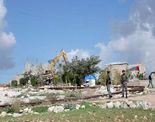
Israeli military handed a Palestinian from Hebron a notice to demolish two water wells and uproot trees in his land, said local sources.
Ratib al-Jabour, coordinator of the Popular Committee against the Wall and Settlements in Yatta, told Palestinian official news agency WAFA that members of the civil administration, the Israeli military's arm in the West Bank, raided the area south of Hebron and handed the land owner a notice to demolish his wells and uproot his trees.
Ratib al-Jabour, coordinator of the Popular Committee against the Wall and Settlements in Yatta, told Palestinian official news agency WAFA that members of the civil administration, the Israeli military's arm in the West Bank, raided the area south of Hebron and handed the land owner a notice to demolish his wells and uproot his trees.
1 apr 2013
Israel Cuts Off Water Supply to 10 Villages Northwest of Jerusalem
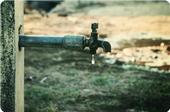
The Israeli authorities Monday completely cut off the water supply to ten villages located northwest of Jerusalem, according to a local official.
Yousef al-Faqeeh, head of joint services council of these villages, told WAFA that the Israeli authorities restricted the amount of water pumped to these villages; residents were living on very small amounts of water and now the water supply is completely cut off.
He added that hundreds of students are suffering from the lack of water in their schools, calling on the relevant sides to promptly intervene to pressure the Israeli authorities to re-pump water to these villages.
He said that the only source of water now is water tanks which the authorities also prohibited.
'Israel cuts water to Palestinian villages'
The Israeli regime has completely cut off water to Palestinian villages in the occupied West Bank, local media say.
Palestinian media reported on Monday that Israeli authorities halted the water flow to 10 villages located northwest of al-Quds (Jerusalem).
According to reports, local Israeli officials had already imposed restrictions on the amount of water pumped to these villages.
Reports also indicated that residents were living on very small amounts of water even before the total halt of water flow.
Locals also said that hundreds of Palestinian students are also suffering from the lack of water in their schools.
The Palestinian NGO, Land Research Centre, also said in a recent report that Israeli settlers from the settlements of Yiztar and Baracha have been using water springs in the Palestinian residents of Burin in order to raise fish.
The Palestinian residents lodged a complaint with Israeli authorities, saying that the settlers use their only source of water, not only for farming but also for their leisure. This is while the Palestinian community suffers water shortages and has to pay extortionate rates for water.
Yousef al-Faqeeh, head of joint services council of these villages, told WAFA that the Israeli authorities restricted the amount of water pumped to these villages; residents were living on very small amounts of water and now the water supply is completely cut off.
He added that hundreds of students are suffering from the lack of water in their schools, calling on the relevant sides to promptly intervene to pressure the Israeli authorities to re-pump water to these villages.
He said that the only source of water now is water tanks which the authorities also prohibited.
'Israel cuts water to Palestinian villages'
The Israeli regime has completely cut off water to Palestinian villages in the occupied West Bank, local media say.
Palestinian media reported on Monday that Israeli authorities halted the water flow to 10 villages located northwest of al-Quds (Jerusalem).
According to reports, local Israeli officials had already imposed restrictions on the amount of water pumped to these villages.
Reports also indicated that residents were living on very small amounts of water even before the total halt of water flow.
Locals also said that hundreds of Palestinian students are also suffering from the lack of water in their schools.
The Palestinian NGO, Land Research Centre, also said in a recent report that Israeli settlers from the settlements of Yiztar and Baracha have been using water springs in the Palestinian residents of Burin in order to raise fish.
The Palestinian residents lodged a complaint with Israeli authorities, saying that the settlers use their only source of water, not only for farming but also for their leisure. This is while the Palestinian community suffers water shortages and has to pay extortionate rates for water.
Israeli settlers steal water from Palestinians: report

A new report reveals that Israeli settlers have been stealing water from Palestinian water springs near the city of Nablus in the occupied West Bank for their fish farms, Press TV reports.
The Palestinian NGO, Land Research Centre, said in a report that Israeli settlers from the settlements of Yiztar and Baracha have been using water springs in the Palestinian residents of Burin in order to raise fish.
Jamal Daoud, a Burin resident, told Press TV that the Israeli settlers confiscated the Palestinian water springs, which are used to irrigate crops.
Daoud also said Palestinians always had problems with Israeli settlers, and for several times the settlers attacked Palestinians on their farms.
The Palestinian residents lodged a complaint with Israeli authorities, saying that the settlers use their only source of water, not only for farming but also for their leisure. This is while the Palestinian community suffers water shortages and has to pay extortionate rates for water.
The Israeli settlements are considered illegal by much of the international community. However, defiant Israeli Prime Minister Benjamin Netanyahu says the settlement construction is part of Tel Aviv’s policy and will not stop.
Construction of Israeli settlements on occupied Palestinian lands violates the Fourth Geneva Convention, which prevents an occupying power from transferring its own population into occupied territory, an act that could be equal to war crimes that fall under the jurisdiction of the International Criminal Court.
The Palestinian NGO, Land Research Centre, said in a report that Israeli settlers from the settlements of Yiztar and Baracha have been using water springs in the Palestinian residents of Burin in order to raise fish.
Jamal Daoud, a Burin resident, told Press TV that the Israeli settlers confiscated the Palestinian water springs, which are used to irrigate crops.
Daoud also said Palestinians always had problems with Israeli settlers, and for several times the settlers attacked Palestinians on their farms.
The Palestinian residents lodged a complaint with Israeli authorities, saying that the settlers use their only source of water, not only for farming but also for their leisure. This is while the Palestinian community suffers water shortages and has to pay extortionate rates for water.
The Israeli settlements are considered illegal by much of the international community. However, defiant Israeli Prime Minister Benjamin Netanyahu says the settlement construction is part of Tel Aviv’s policy and will not stop.
Construction of Israeli settlements on occupied Palestinian lands violates the Fourth Geneva Convention, which prevents an occupying power from transferring its own population into occupied territory, an act that could be equal to war crimes that fall under the jurisdiction of the International Criminal Court.
25 mar 2013
IOA steals 82% of the Palestinian water under the Oslo accords
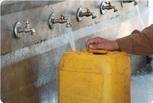
A Palestinian expert on water and environment issues stressed that technical and political problems in Oslo accords signed between the PLO and the occupation authorities "left the main water sources in Israeli hands, limiting the Palestinian role as providing services."
"The problem was the postponement of solving the water issue in Palestine to the final negotiations," director general of Palestinian Hydrology Group, Abdul Rahman Tamimi, said during a seminar in Ramallah, adding that "the agricultural water issue has not been addressed in the accords."
He pointed out that the Israeli occupation steals 82 per cent of Palestinian water.
Tamimi strongly criticized the Palestinian negotiator's failure in defending the Palestinian water rights in the Oslo accords, especially as it did not include the Palestinian right in the Jordan River water at the time it included the Israeli right to veto any future talks on the water issue and to confiscate all Palestinian wells.
The future of the conflict in Palestine and the Middle East will be over water resources, in light of the Israeli control over the Palestinian natural, economic and human resources, Tamimi explained.
"The problem was the postponement of solving the water issue in Palestine to the final negotiations," director general of Palestinian Hydrology Group, Abdul Rahman Tamimi, said during a seminar in Ramallah, adding that "the agricultural water issue has not been addressed in the accords."
He pointed out that the Israeli occupation steals 82 per cent of Palestinian water.
Tamimi strongly criticized the Palestinian negotiator's failure in defending the Palestinian water rights in the Oslo accords, especially as it did not include the Palestinian right in the Jordan River water at the time it included the Israeli right to veto any future talks on the water issue and to confiscate all Palestinian wells.
The future of the conflict in Palestine and the Middle East will be over water resources, in light of the Israeli control over the Palestinian natural, economic and human resources, Tamimi explained.
21 mar 2013
Israel Controls Renewable Water Resources, says Statistics Bureau

Israel controls the renewable water resources, restricts access to it and imposes obstacles on the drilling of new water wells, Palestinian central bureau of statistics (PCBS) and the Palestinian water authority (PWA) said Thursday. PCBC and PWA, in a press release issued on the occasion of the world water day March 22, 2013 presenting the key indicators related to water in Palestine, said that Israel controls the majority of renewable water resources totaling 750 MCM, while Palestinians receive only about 120 MCM.
They added that Israel is the one to be blamed for the shortage in water in Palestine, whereas 75 MCM of water supplied to the settlements, of which 44 MCM was obtained from wells controlled by Israel in the West Bank.
Moreover, Water is priced at 2.7 NIS per cubic meter in the West Bank and 2.4 NIS per cubic meter in the Gaza Strip, households not connected to water network pay higher prices, according to statistics.
Results from the 2011 survey showed that 91.8% of households in Palestine live in housing units connected to a water network; 89.4% in the West Bank and 96.3% in the Gaza Strip.
Households that are not connected to water networks rely on purchasing water tanks that are extremely expensive (24.4 NIS per cubic meter), and there is no guarantee of the water quality, said PCBC and PWA.
They added that Israel is the one to be blamed for the shortage in water in Palestine, whereas 75 MCM of water supplied to the settlements, of which 44 MCM was obtained from wells controlled by Israel in the West Bank.
Moreover, Water is priced at 2.7 NIS per cubic meter in the West Bank and 2.4 NIS per cubic meter in the Gaza Strip, households not connected to water network pay higher prices, according to statistics.
Results from the 2011 survey showed that 91.8% of households in Palestine live in housing units connected to a water network; 89.4% in the West Bank and 96.3% in the Gaza Strip.
Households that are not connected to water networks rely on purchasing water tanks that are extremely expensive (24.4 NIS per cubic meter), and there is no guarantee of the water quality, said PCBC and PWA.
3 mar 2013
Occupation prevents restoration of water wells in northern Jordan Valley
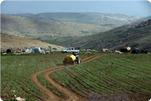
Israeli occupation forces prevented residents of two hamlets in northern Jordan Valley from repairing and restoring five wells that form their main source of water.
Local sources said that the residents of Khirbat al Hadidiya have started few days ago repairing two wells, but the occupation authorities stopped them and prevented them from working on the wells with no reason.
Residents of Khirbet Samra have also been banned from restoring three old water wells, under flimsy pretexts.
Aref Daraghmeh, activist in the Jordan Valley's issues, told PIC's correspondent that the 5 wells supply water to more than 30 families in the area, adding that the occupation authorities have been preventing the use of the wells in an attempt to push the residents to leave the area.
Local sources said that the residents of Khirbat al Hadidiya have started few days ago repairing two wells, but the occupation authorities stopped them and prevented them from working on the wells with no reason.
Residents of Khirbet Samra have also been banned from restoring three old water wells, under flimsy pretexts.
Aref Daraghmeh, activist in the Jordan Valley's issues, told PIC's correspondent that the 5 wells supply water to more than 30 families in the area, adding that the occupation authorities have been preventing the use of the wells in an attempt to push the residents to leave the area.
27 feb 2013
IOF soldiers destroy water network south of Jenin
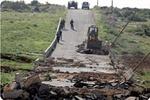
Israeli occupation forces (IOF) destroyed a water network supplying Meriha village, south of Jenin, with fresh water while bulldozing streets in its vicinity on Wednesday.
Samer Abu Bakir, the head of Yabad municipality, told the PIC that IOF bulldozers destroyed the main water pipeline supplying the 500 inhabitants of Meriha village with water. He noted that the pipeline is affiliated with his municipality.
He said that his village was under constant IOF attacks including occupying houses, closing roads, and destroying infrastructure.
The mayor said that IOF bulldozers closed the southern and western entrances to the village.
IOF troops prevented farmers from heading to their fields in Yabad and Arrabe plains at the pretext that stones were thrown on settlers cars, which is in fact a mere pretext to control the area.
Samer Abu Bakir, the head of Yabad municipality, told the PIC that IOF bulldozers destroyed the main water pipeline supplying the 500 inhabitants of Meriha village with water. He noted that the pipeline is affiliated with his municipality.
He said that his village was under constant IOF attacks including occupying houses, closing roads, and destroying infrastructure.
The mayor said that IOF bulldozers closed the southern and western entrances to the village.
IOF troops prevented farmers from heading to their fields in Yabad and Arrabe plains at the pretext that stones were thrown on settlers cars, which is in fact a mere pretext to control the area.
24 feb 2013
IOA to destroy water well

An Israeli court in Beit El decided to destroy a Palestinian water well in Tanak village, west of Jenin, in line with the Israeli occupation authorities’ declared war on Palestinian water resources in the West Bank. Local sources said that the IOA delivered the court decision to the owner of that well, Abdulrahman Zayud.
They said that Zayed uses his artesian water well for drinking and irrigation purposes.
The court said that the well was not licensed while the IOA refuses to give licenses to Palestinians to dig for wells.
They said that Zayed uses his artesian water well for drinking and irrigation purposes.
The court said that the well was not licensed while the IOA refuses to give licenses to Palestinians to dig for wells.
21 jan 2013
Soldiers Kidnap Four Palestinians, Demolish Property

Palestinian sources reported that Israeli soldiers kidnapped four Palestinians in the West Bank districts of Jenin and Tubas. The army also demolished a Palestinian home, a hothouse and a well near Hebron.
The army invaded Rommana village, near the northern West Bank city of Jenin, and kidnapped one resident identified as Farid Ghazi Mahajna, 27, after breaking into his family’s home and violently searching it.
It is worth mentioning that the brother of Mahajna was kidnapped by the army a month ago after the soldiers shot and injured him.
In Qabatia town, also near Jenin, the army kidnapped one resident identified as Jasser Amin Nazzal, 32.
Soldiers broke into his home and violently searched it after forcing the family out in the cold.
The army also invaded Al-Arqa village, west of Jenin, and fired several flares and concussion grenades while the soldiers marched in the village.
Furthermore, soldiers invaded Aqaba town, in the Tubas district, broke into a home and searched it before kidnapping a father identified as Suleiman Radi As-Sayyid, 55, and his son, Firas, 28.
In the Hebron district, in the southern part of the occupied West Bank, the army invaded the nearby town of Yatta, and demolished a home, a hothouse, and a well.
Several armored Israeli military vehicles invaded the town and demolished a two-story home that belongs to resident Hamad Mohammad Al-Amour, leaving him and his 15 family members in the cold.
Soldiers went on to demolish a hothouse and a well that belong to a resident identified as Mousa Mohammad Makhamra.
In related news, Israeli soldiers shot and wounded a Palestinian worker near the Erez (Beit Hanoun) Crossing, in the northern part of the Gaza Strip.
Medical sources reported that Abdullah Abu Ma’rouf, 19, was shot in his right leg, and was moved to Kamal Odwan hospital suffering moderate injuries.
The latest Israeli military attacks are part of ongoing and systematic violations against the Palestinians, their property and lands in different parts of occupied Palestine.
Israeli Military Demolishes Home, Water Well
The Israeli military government demolished Monday a two-story home and a water well east of the West Bank town of Yatta, south of Hebron, according to a local activist. Ratib Jbour, from the anti-settlements committee, told WAFA that an Israeli army force with officials from the zoning and planning department in the civil administration, Israel’s military arm in the occupied West Bank, demolished the two-story house Hamad Amour was living in with his 16-member household.
The army claimed the house was built in Area C of the West Bank, which is under full Israeli military control.
The Israelis also demolished a water well used by Mousa Makhamreh to irrigate his land and a barn in a different area of Yatta.
The army invaded Rommana village, near the northern West Bank city of Jenin, and kidnapped one resident identified as Farid Ghazi Mahajna, 27, after breaking into his family’s home and violently searching it.
It is worth mentioning that the brother of Mahajna was kidnapped by the army a month ago after the soldiers shot and injured him.
In Qabatia town, also near Jenin, the army kidnapped one resident identified as Jasser Amin Nazzal, 32.
Soldiers broke into his home and violently searched it after forcing the family out in the cold.
The army also invaded Al-Arqa village, west of Jenin, and fired several flares and concussion grenades while the soldiers marched in the village.
Furthermore, soldiers invaded Aqaba town, in the Tubas district, broke into a home and searched it before kidnapping a father identified as Suleiman Radi As-Sayyid, 55, and his son, Firas, 28.
In the Hebron district, in the southern part of the occupied West Bank, the army invaded the nearby town of Yatta, and demolished a home, a hothouse, and a well.
Several armored Israeli military vehicles invaded the town and demolished a two-story home that belongs to resident Hamad Mohammad Al-Amour, leaving him and his 15 family members in the cold.
Soldiers went on to demolish a hothouse and a well that belong to a resident identified as Mousa Mohammad Makhamra.
In related news, Israeli soldiers shot and wounded a Palestinian worker near the Erez (Beit Hanoun) Crossing, in the northern part of the Gaza Strip.
Medical sources reported that Abdullah Abu Ma’rouf, 19, was shot in his right leg, and was moved to Kamal Odwan hospital suffering moderate injuries.
The latest Israeli military attacks are part of ongoing and systematic violations against the Palestinians, their property and lands in different parts of occupied Palestine.
Israeli Military Demolishes Home, Water Well
The Israeli military government demolished Monday a two-story home and a water well east of the West Bank town of Yatta, south of Hebron, according to a local activist. Ratib Jbour, from the anti-settlements committee, told WAFA that an Israeli army force with officials from the zoning and planning department in the civil administration, Israel’s military arm in the occupied West Bank, demolished the two-story house Hamad Amour was living in with his 16-member household.
The army claimed the house was built in Area C of the West Bank, which is under full Israeli military control.
The Israelis also demolished a water well used by Mousa Makhamreh to irrigate his land and a barn in a different area of Yatta.
Page: 2 - 1
